- Home
- David Guterson
The Other Page 2
The Other Read online
Page 2
We slowed. There were people pushing strollers, kids feeding ducks, joggers, walkers, and bicylists. I said, “Are you a fag?”
“No.”
“Just a rich bastard.”
“Let’s race to the bathhouse.”
He picked up his pace, so did I, and we ran grimly, forcing anyone coming toward us out of our way. I lost, and when I’d caught my breath, shortly after he did, I said, “How much did you pay for those shoes?”
We watched girls go by and made comments. We jumped into the lake. John William had dope in his car, which was also full of fast-food wrappers and empty chocolate-milk cartons. We went over to Beth’s Cafe, bloodshot and reeking, ate like pigs, and then bought two bottles of MD 20/20 at a place on Ravenna Boulevard that didn’t card people. Later that night, John William drove the wrong way down a one-way street. Around two in the morning, we stole onto the grounds of the Seattle Center with the idea of wading in pools there and collecting coins. By day, the center could be crowded with visitors to the Space Needle—that self-consciously futuristic 605-foot tower which, as Seattle’s most popular tourist attraction, presides over the north end of its skyline like a moored UFO—the amusement park, the science exhibits, the Flag Pavilion, or the Monorail, but on this night it was rain-racked and so utterly deserted as to feel menacing. John William and I jogged past the locked-down barker booths with their giant pink teddy bear and faux-feather boa prizes, then stopped to toke by the Food Circus. On our left, the three legs of the Needle held up its rotating restaurant, their surfaces lit from below by floodlights. I told John William that the Needle’s observation deck reminded me of a mushroom, and his answer was “I hate the Space Needle.”
“Me, too.”
“I hate this whole place.”
“So do I.”
We jogged on, passing a closed sno-cone booth and the dark Exhibition Hall, where about twelve years before, at the Century 21 Exposition, I’d taken a simulated space flight in the Spacearium with my parents and Carol. At the pools that John William and I planned to pick clean of change, on the far side of the Flag Pavilion and in the courtyard of the Pacific Science Center, the fountains had all been turned off for the night, but the water surfaces were so roiled by raindrops that the coins below, in wee-hour city light, shimmered like cinematic pirate booty. I have to describe this place not as I think of it now—as a museum I’ve visited with my sons to enhance their appreciation of science (and, on the way out of the exhibits on dinosaurs or computers, to watch them, with paternal sentiment, make wishes and toss pennies)—but as it appeared to me that night, when I was a teen-ager on the cusp of petty crime. Those pools sat under neo-Gothic arches higher than a lot of downtown buildings, arches reminiscent of the flying buttresses I’d seen in photographs of cathedrals. If you live in a place devoid of much architectural interest, such arches can impress you. They impressed me. They might have been something from M. C. Escher in a slightly less hallucinatory mood than usual. Those vaulting, fretted complications full of latticed interstices, and as delicate and stout as whalebone overhead, gave the courtyard of pools an extraterrestrial ambience, or at least the quality of a dreamworld.
Such as it was and I was. I was also cold, rain-soaked, and paranoid, but with John William I waded in, knee-high, and gathered coins. We stuffed our wet jacket pockets and worked like peasants in rice paddies. If you imagine yourself committing this crime, you’ll realize that your field of view is limited to the water immediately below your eyes and to the bottom of the pool, where the coins lie. You don’t notice much other than the positions of coins and the movements of your hands underwater to make retrievals. The truth is that in short duration this sort of harvesting is mesmerizing. If you’re only at it for twenty minutes or so, your back doesn’t hurt and you can enjoy the rhythm, the distorted view through water (and, in this case, the luminous and agitated reflection of those neo-Gothic arches, inverted and foreshortened), and the giddiness of a furtive and illegal act. There’s the further pleasure—not everyone enjoys this, and teen-agers enjoy it more often than adults—of surrendering to being soaked on a rainy night.
But I can’t explain why we were stealing coins at the Seattle Center. It makes no sense to me now, though it must have made sense to me then. I just don’t recall what that logic was, other than to say that, for my part, I was doing something John William wanted to do and, one thing leading to another, I hadn’t dropped out along the way. Maybe it was a little like manna from heaven—this scattered, free money in a deserted public place—and so all the more tantalizing. However it was, we had only an aqueous glow to work by, which meant we bent our heads farther than we might have. Intent like this on our underwater misdemeanors, we were discovered by a uniformed security guard, whom we didn’t notice until he said, to our backs, “Hey, you little long-haired shits, you’re under arrest.”
I wanted to run. We had the natural advantage of being young half-milers, and my impulse was to use it. This guard didn’t appear particularly fit. I don’t remember details other than his muttonchop sideburns and the way he kept his thumbs on his belt like a sheriff in a western, but I do remember feeling he’d have a hard time covering half a mile in two minutes. Granted, we’d be weighed down by watery clothes, but running was still the answer, from my perspective. And so, dropping the coins in my hand, I waded heavily toward a far edge. John William, though, just stood in the pool with a fistful of change while the guard pried open a sheath on his belt, pulled from it one of those giant handheld radios that were state-of-the-art for law enforcement in the seventies, raised it to his lips, and pressed the TALK button. “Base,” he said, and that was when John William threw change in his face, lunged for his knees, and, in pulling him into the water, dislocated his hip—although I shouldn’t say I’m certain about the injury. I just assume his hip was dislocated because the angle of his leg seemed improbable while he splashed and flailed.
We fled in water-logged shoes, and so loaded down by coins they slowed us and made my jacket bounce. I zipped my pockets along the way so as not to leave a trail of change in my wake and followed John William across the Great Northern tracks at Broad Street, and from there into the brush between Elliott Bay Park—now Myrtle Edwards Park—and the railroad bed with its bull rock and broken glass. A lot of Seattleites stand here to watch the city’s Fourth of July fireworks display, but the rest of the year it’s frequented by the transient and destitute, who for decades have rolled out their mildewed sleeping bags in the Scotch broom because no one tells them not to. That’s where we found ourselves. In the high weeds, we lay on our backs to catch our breath and let the rain pelt us. I didn’t feel stoned anymore, and my tide of juvenile adrenaline hadn’t crested—instead, I felt washed out and attentive to fresh dangers. John William, though, had his hands over his face. He was clutching his skull, his fingers in his hair, the heels of his palms against his eye sockets, and I realized that he was crying. I was silenced by it, because none of my friends or cousins cried, and neither did I, in front of people.
“I think I hurt that guy,” John William said, after a while. “Did he hit his head?”
“I couldn’t tell you.”
“Did he get out of the water?”
“I don’t know.”
“We should go back,” John William said. “I want to take him to a hospital. I have to apologize.”
“Go ahead, then.”
He cried more, which I waited out by turning away from him.
“Wishing money,” said John William, when he’d composed himself, “is the money little kids throw in the water when they’re wishing they’ll never have to die and everyone will always be happy.”
“I thought of that myself.”
“I always wished everyone could be happy when I was a kid blowing out candles. And for no death.”
“Me, too.”
“Except for my parents. They can be unhappy and die.”
It sounded like something a rich kid would say, and since I di
dn’t understand it, I didn’t answer.
At the south end of Elliott Bay Park, under a roof overhang on Pier 70, we saw someone sitting against a creosoted timber, wrapped in a sleeping bag and wearing what looked to be one of those synthetic coonskin caps kids used to get for Christmas—an acne-scarred Indian planted between brown plastic garbage sacks and burlap bags—and when he asked if we could spare some change, we both put all the coins we had into his outstretched coffee tin.
JOHN WILLIAM HAD a Chevrolet Impala with cream paint and a vinyl top. His parents bought it new in ’67 and drove it for five years before handing him the keys, and it was this Impala that we used, as frequently as we could, to light out for the territories—to light out with all the subtext of escape implied by that phrase from Huck Finn. Before we were nineteen, we had already climbed Mount Saint Helens (before it famously blew), Mount Rainier, Mount Baker, and Mount Adams—in short, we were mountaineers at an early and reckless age. We’d hiked beside the ocean from Point of the Arches to the Quillayute Needles, and we’d seen the Pickets in the North Cascades, and the range above the Hoh now known as the Valhallas but back then still called the Pleiades. That Impala served us well. Once, near Yellow Bluff, on State Route 109, along the coast, John William pulled over to face the breaking waves and told me that here, where we were now sitting, looking at the ocean on a summer afternoon, something had happened which he remembered in detail from five years earlier—from the year when his mother, Ginnie Barry, landed in a psych ward.
In the spring John William was telling me about—the spring of ’67—she’d become obsessed with Ralph Nader’s Unsafe at Any Speed and wouldn’t eat in restaurants because of DDT and BHC. She kept a copy of New and Nonofficial Drugs on her bedside table and became an expert on adrenal glands. She was forty-six, and she’d lost weight to the point where her blouses and jackets hung from her prominent clavicles like sheets. She stayed in bed a lot, with her face sandwiched between fat pillows, worrying, she told John William, that the prevailing winds had driven nuclear radiation toward Seattle from H-bomb test islands in the South Pacific. Examining the Impala one afternoon, she insisted that its windshield appeared pitted by an airborne pollutant no one talked about. The plants in the yard were dying, too—everything looked bleached to the wrong color, in her eye, especially the laurel hedges.
One Saturday night, John William explained, his father decided to weather-treat, in the basement, his sailing sloop’s teak hatch covers. Before long, his mother got her car keys, trapped a note under a refrigerator magnet—RAND, YOU’VE POISONED US WITH VARATHANE—and told John William to get his coat.
John William was eleven. His mother drove off after forcing him into the back seat, where he kept a stack of comic books. They made their way south on old 99, and by midnight they’d driven around Puget Sound and were speeding west, toward the true ocean of breakers and swells—the ocean as opposed to the inland sea near Seattle—which his mother believed was cleansing. She told him this. There were mythic overtones to the ocean, she said, that shouldn’t be underestimated. John William replied that from his point of view it didn’t seem normal to leave for the ocean so late at night without planning and without Dad. His mother struck back with a lecture on Varathane. The entire family of polyurethanes posed a threat to humankind, she told him. They reached the coast in darkness and knew they were there from the din of the surf and the line of white rollers in the Impala’s diffuse headlights. “Ah, love,” said John William’s mother, pressing the button that let down her window and quoting from Matthew Arnold’s “Dover Beach,” “let us be true to one another,” and then she began crying with a hand over her mouth while the ocean air funneled in. Next she sat listening to the waves with her forehead propped against the steering wheel. There was a long spate of nose blowing before she reached into her handbag for a scarf and tied it under her chin. “Well,” she said, drying her eyes, “that’s the melancholy, long withdrawing roar you’ve heard tell of, John William, retreating to the breath of the night-wind down the naked shingles of the world.”
“I don’t understand what you’re talking about,” John William replied.
“For the world,” his mother recited, “which seems to lie before us like a land of dreams, hath really neither joy, nor love, nor light, nor certitude, nor peace, nor help for pain. So now I think I’m going to take that beach walk I came all this way down here for.”
“It’s dark and it’s raining.”
“Ever more purifying.”
“Why are you doing this?”
“For its cleansing properties.”
“You’re acting strange,” John William pointed out.
“What’s strange,” answered Ginnie, “is what’s normal.”
She disappeared then. We have to imagine John William before 911 and cell phones getting out of the Impala every once in a while to lean into the darkness and yell for his mother—his voice disappearing into the Pacific—and honking the horn a lot, which was grating and hard to listen to for long, even switching on the headlights and then coming to believe that in the swirl of white water he could see her like a silkie from an Irish yarn, next calming down enough not to believe it, resorting to his comic books but not distracted by them, as he hoped to be, finally going out onto the beach, where he tripped on driftwood and cut his palm on a shell, though not badly, and got soaked in the dark. She could have gone either way, he knew, and the coast was long. He sat in the car again, in the front seat this time, thinking now of horror stories involving lone parked cars on dark rainy nights, and weaving these phantasms together with the creeping suspicion that his mother had committed suicide in the salty undertow of the ocean. With this intimation came a pang of guilt: Why had he let her stumble off, crying, into this ominous night landscape? And also anger: Why had she included him in her willed death by drowning? Why had she brought him along?
When it was light enough and the rain had tapered off, he went out onto the road and flagged down the first car coming down from Moclips. This was a desolate stretch of coast, so it wasn’t until noon that the hunt for his mother was in full swing, involving the Coast Guard, a search-and-rescue team, and volunteers with dogs. John William was given a cheese sandwich and a cup of hot chocolate. His father arrived with family friends, the Mitchells—the Barrys’ golf-and-boating partners—and with John William’s aunt and uncle, Sis and Walter. John William’s father got out of the Mitchells’ Lincoln Continental carrying binoculars and his Burberry rain slicker. “I’m sorry, son,” he said. “I’m sorry you’ve had to put up with this.”
What followed was a lot of stumbling over driftwood and a lot of talking into handheld radios. It began to get cold; the tide came in. At around six, John William’s mother was located, sitting under a tree on Yellow Bluff, and when she was brought down from there, wind-whipped and sea-sprayed, John William heard a search-and-rescue volunteer use the term “fruitcake.” At dusk, John William’s father put his mother into the back seat of the Lincoln and slid in beside her like a bodyguard. “That’s all,” he said. “We’ve all had enough, Ginnie. Just look what you’ve put John William through.”
“Move away, Rand,” she answered. “You’re poisonous.”
I REMEMBER WHERE John William lived with his father. It was a Tudor in Laurelhurst, behind trimmed hedges, from the outside staid, but inside modern. Matched suspension chairs, a tripod table with a smoked-glass top, a stereo console in bleached white birch, a sectional sofa with wedge-shaped cushions—it was the style once known as Contemporary Living, the House of Today from yesterday, the house trumpeted as futuristic at the Seattle World’s Fair in ’62. Laurelhurst is among our city’s most coveted neighborhoods, and the Barrys lived on the water there, with a fine lawn falling to the Lake Washington shore. Yet their Tudor, in its context, didn’t look immodest. To get there, you drove on East Laurelhurst Drive, underneath elms and past Spanish-style mission homes and grandly scaled Craftsman mansions. A lot of Laurelhurst is labyrinthine and claust
rophobic, chiefly because every square foot of its real estate is worth so much, but from the Barrys’ east windows, giving out onto the lake, there was no hint of this urban density. What you saw instead was their L-shaped dock, and Rand’s sloop—the Cornucopia II—cradled and cleated, with bumpers out. Since Rand was gone a lot on sales trips, John William and I often raided his onboard liquor cabinet. In the house, we uncorked wine bottles and foraged through stainless-steel cupboards, where Rand kept, as I recall, green olives with pimientos and table water crackers. There was also very little in the refrigerator—Brie in crumpled cellophane, a lonely bottle or two of Heineken, herring in cream sauce, maybe a shriveled lime. John William was on the wing-it food program. He ate pot pies or pizza for dinner. I saw Rand maybe half a dozen times in over two years—like most teen-agers, I didn’t want to meet parents—because I made it a point to leave the house before he came home from work, or I went there only when I knew he was traveling, when his house was available for a free-for-all. I never saw Ginnie, since she lived in Taos, but I did spend time in her high-ceilinged study, the door to which had apparently been shut since she left for New Mexico and never opened again, at least by Rand. John William and I smoked dope from a waterpipe, sitting cross-legged on her Persian rug, and cranked up the expensive stereo system in her cabinet, which included a tape deck with UV meters and four audiophile’s speakers. This study was furnished artiste-style: a divan, a writing table, a small vintage typewriter, rarefied art books, poetry journals, and a fireplace with andirons and tongs. Ginnie’s private bathroom, entered from her study, was wallpapered with white-bellied nudes and decorated with half-melted candles in wrought-iron holders. There was a hammered-brass tub for toilet-seat magazines (Art World, The Nation, Seattle), and those nudes making you self-conscious while you tore off toilet paper. They were even on the ceiling, like Michelangelo’s Eve. There was also a very rough Georgia O’Keeffe pencil sketch, signed by the artist in a tremulous hand, but was it a man on a horse or an adobe hut?

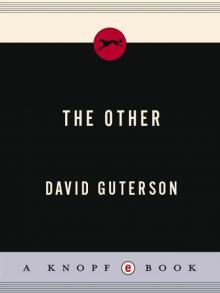 The Other
The Other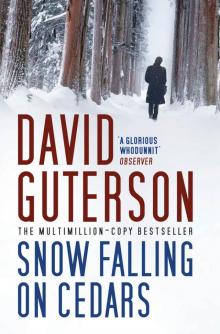 Snow Falling on Cedars
Snow Falling on Cedars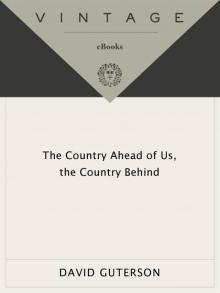 The Country Ahead of Us, the Country Behind
The Country Ahead of Us, the Country Behind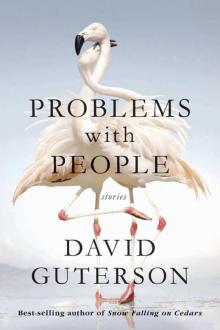 Problems With People: Stories
Problems With People: Stories East of the Mountains
East of the Mountains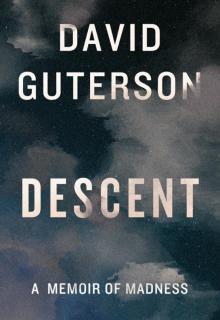 Descent: A Memoir of Madness
Descent: A Memoir of Madness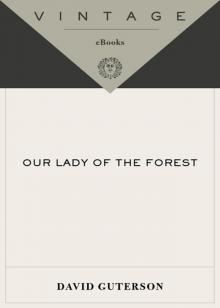 Our Lady of the Forest
Our Lady of the Forest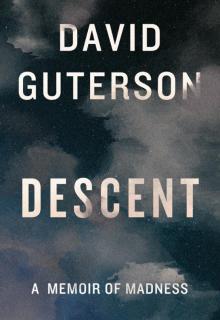 Descent
Descent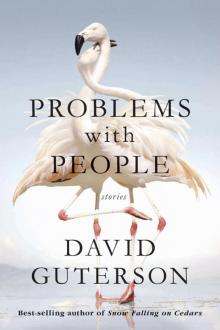 Problems with People
Problems with People